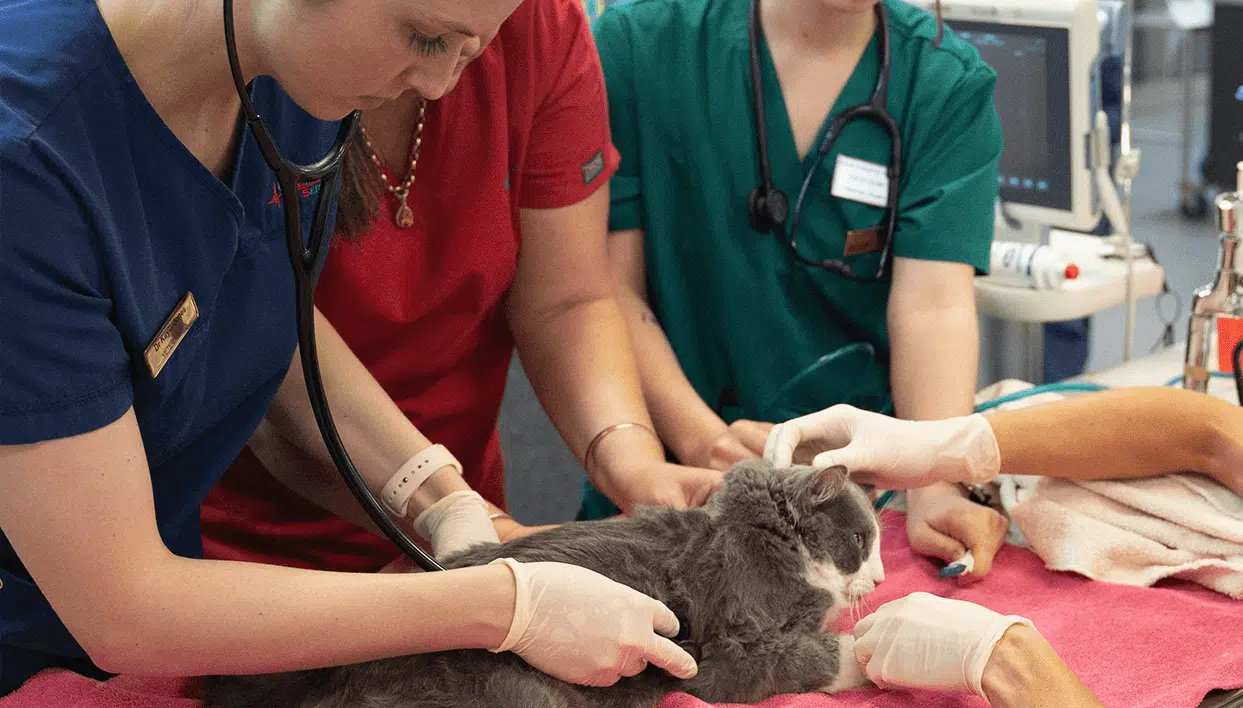Have you ever achieved something great and then immediately felt like a fraud? Like you’re not qualified or deserving of your success? If so, you’re not alone. This feeling is known as impostor syndrome, and it’s surprisingly common. Impostor syndrome can be defined as the belief that you’ve only succeeded due to luck, and not because of your talent or qualifications.
This feeling can be especially pronounced in high-achieving individuals who are used to being at the top of their game. If you’re struggling with impostor syndrome, know that you’re not alone and that there are ways to manage these feelings. Let us walk you through some techniques to overcome imposter syndrome.
Why do so many veterinarians suffer from Imposter Syndrome?
Impostor syndrome is that nagging feeling that you’re not quite as intelligent or talented as people think you are. It’s that little voice in your head that says your achievements are just down to luck, or timing, or being in the right place at the right time. Impostor syndrome can affect anyone, regardless of their achievements. It’s common among high achievers, and it can be particularly debilitating.
The good news is that there are things you can do to overcome impostor syndrome. By understanding the condition and recognising its symptoms, you can start to silence that inner critic and build confidence in your abilities. With a little effort, you can learn to embrace your success and achieve even greater things. Impostor syndrome doesn’t have to hold you back any longer.
Many people who are new to a field or who are trying to enter a new field may feel like they don’t belong there. It can be especially challenging in the veterinary field, where you are constantly surrounded by people who seem to know exactly what they’re doing. However, impostor syndrome is something that you can overcome with time and practice. The key is to remember that everyone starts somewhere and that everyone has their own unique skills and knowledge to contribute. With this in mind, try to stay confident and focus on the things that you do know. In time, you’ll develop the skills and knowledge that you need to feel like you belong.
When does the Imposter Syndrome hammer strike?
So let’s talk about when the great hammer of imposter syndrome often strikes. It might surprise you that it often strikes during times of success. When veterinarians reflect back on the times where it’s come up most powerfully for them, it’s been when they started a new job, when they got an award for something, when they took on extra responsibility like running a hospital, or managing a team of people or becoming a business partner. These are big career milestones for any veterinarian, and that’s when imposter moments can creep in.
But it’s not only in the workplace that it can sneak up on us. It can also happen in other parts of our life. For example when you become a parent and you realise that suddenly, you are responsible for a tiny human being and that you actually have no idea what you are doing. Every little noise the baby makes, every time the baby cries, you are sure that you are about to screw up somehow. And it can take a long time to realise that this feeling is absolutely normal.
Reframing your thoughts
Impostor syndrome is the feeling of fraudulence or inadequacy in spite of evidence to the contrary. For many people, the fear of being exposed as an impostor can be paralysing. Fortunately, there are ways to overcome this feeling. One of the first steps is to recognise that impostor syndrome is common and affects people from all walks of life. Once you understand that you are not alone in feeling like an impostor, it can be easier to face your fears and take positive steps forward.
Another helpful step is to talk about your feelings with someone you trust, like approaching a veterinary mentor. Talking openly about your experiences can help to reframe your thinking and give you a more realistic perspective. If you are struggling with impostor syndrome, remember that you are not alone and there is help available. With effort and support, you can overcome this obstacle and reach your full potential.
Once you know that your feelings of self-doubt are coming from impostor syndrome, you can start to work on reframing your thoughts. This means challenging the negative thoughts that come with impostor syndrome and replacing them with more positive, realistic ones. For example, instead of thinking “I’m going to be found out as a fraud,” you can think “I have valuable skills and experience.” Impostor syndrome is common, but it doesn’t have to hold you back. With a little awareness and effort, you can overcome it and achieve your goals.
If you’re feeling like you don’t belong or like you’re out of your depth at work, you’re not alone. It can be extremely difficult to shake this feeling, but it’s important to remember that everyone feels like an impostor at times. The best way to combat impostor syndrome is to stay positive and to focus on your successes. Whenever you accomplish something, take a moment to celebrate your achievement. This will help you to build confidence and to remind yourself that you are capable of doing great things.
Instead of `I’m not good enough,’ try telling yourself `I’m just starting out and I’m learning’ ‘or I’m not able to do this…yet’. This will help you to see your mistakes as part of the learning process instead of proof that you’re not capable. You can also build up your confidence by seeking out feedback and positive reinforcement from others.
Be it until you see it!
There’s a good chance you’re more capable than you think you are. That’s because real frauds don’t feel like this. So why is that important? Because when you feel those imposter moments, the next steps that you take in response to that can either inspire you to work harder, leading you to further success and recognition, or they can lead you to downshifting. That’s where you revise your goals down because it feels too scary. You start to think small and become less ambitious. And if you go down that road, chances are you’re not going to fulfil your full potential. So there are some common thoughts and one-liners associated with imposter syndrome.
A lot of people tend to shy away from opportunities because they don’t feel confident enough. They think they need to know everything before taking that first step. But our mantra is ‘You gotta be it until you see it!’. That’s much more powerful than saying fake it until you make it, because there’s sometimes where you have to take this leap of faith and just roll with it. Despite the fact you might see yourself as not being able to do it.
So instead of thinking of yourself as winging it or faking it and that makes you feel like you’re a fraud, you gotta learn to do what a lot of high achievers do and view it as an ability, an opportunity to back yourself. Then just roll with the challenge and be it till you see it. That’s a skill to develop – don’t wait until you feel confident to start putting yourself out there or taking action. So the next time you’re feeling doubtful about your abilities, remember to Be It Until You See It!
Being an emergency vet is daunting. You see a lot of things that plain old general practice vets wouldn’t see as much of. Be it car accidents, bites, strange ingestions or cardiac arrests. But being an emergency vet also comes with its perks because you learn how to think on your feet and be prepared for anything… literally anything. That’s why I always tell newbies in the field to view themselves as a work in progress. Because you never know what’s going to walk through that door and the confidence to deal with it comes from knowing that no matter what it is, you can figure it out. Be it until you see it. So if you’re ever feeling lost or out of your depth, just remember that we’re all a work in progress. And the best thing you can do is try your best and never give up.
Imposter Syndrome as an emergency veterinarian
Doubting your abilities is normal, especially when you’re under pressure. As an emergency veterinarian, the stakes are high and there is often no room for error. The best thing you can do in this situation is to trust your instincts and make a decision. Even if it turns out to be the wrong decision, at least you took action with the best information you had at the time. Remember, the worst thing you can do is to freeze up and make no decision at all. Trust yourself and what you know—you’ll be surprised at how often it leads you in the right direction.
One of the best ways to deal with imposter syndrome is to learn from your mistakes and seek internal validation. Whenever something goes wrong, take a step back and ask yourself what you could have done differently. This will help you to avoid making the same mistake twice and will give you the confidence to move forward. Additionally, it is important to realise that not everyone will always agree with you or see things your way. Seek validation from yourself first and foremost, and don’t be afraid to stand up for what you believe in, even if others don’t agree. Learning this lesson has helped me immensely in dealing with my imposter syndrome.
It’s important to be able to take feedback well in order to grow in your career. You have to be able to see that the constructive criticism you receive is not a personal insult, but rather an opportunity to learn and improve. As you move up in your career, there will be less and less people congratulating you and telling you that you did a great job. Instead, it will become your job to support and congratulate the people who work for you. That’s why it’s important to develop an inner self-confidence, so that you can tell yourself that you’re confident and skilled, and you don’t need someone else to tell you that. Take the time to nurture your inner self-confidence, and you’ll be better equipped to handle the inevitable constructive criticism you’ll receive throughout your career.
That’s a wrap
When it comes to imposter syndrome, one of the best things you can do is to be prepared with strategies to tackle it when it does come up. Imposter syndrome is something that can affect anyone, regardless of their experience or success level. The key is to not let it keep you frozen and instead use it as motivation to push yourself forward. Remember, just because you have imposter thoughts doesn’t mean you have to live an imposter life. So next time those thoughts come up, use one of these strategies to push through and take action:
- Acknowledge the thought and then reframe it. For example, instead of thinking “I’m not qualified for this” try thinking “I’m qualified enough to give this a shot.“
- Write down the evidence that disproves the thought. For example, if you’re thinking “I’m not good enough“, compile a list of all the successes you’ve had in your career so far.
- Talk to someone else about it. It can be really helpful to talk to someone who has experienced imposter syndrome themselves and hear how they coped with it. This can help you feel less alone and more motivated to take action.






